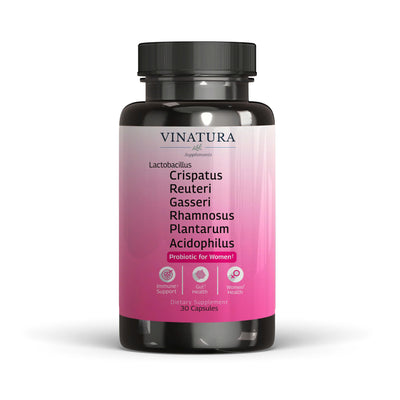
What Are the Benefits of Serrapeptase for Fertility?
Serrapeptase for fertility has become a topic of growing interest among women. It is often described as a natural enzyme that eliminates toxins, prevents blood clots, and reduces inflammation in reproductive organs. But how accurate are these claims?
This article reviews available evidence to clarify the potential role of serrapeptase in reproductive health.
Before exploring further, please read the disclaimer located at the end of this webpage.
Key Takeaways
- Serrapeptase may benefit fertility by addressing inflammation, which is often a root cause of reproductive issues such as uterine fibroids, endometriosis, and ovarian cysts.
- While serrapeptase supplementation is generally considered safe, it's essential to consult a healthcare professional before use, especially during pregnancy or when trying to conceive.
Can Serrapeptase Help with Fertility?
Serrapeptase is a proteolytic enzyme that breaks down and eliminates unnecessary proteins in the bloodstream.
Its enzymatic action may help dissolve non-living tissue, including scar tissue and fibroid cysts, potentially supporting reproductive health. In addition, it can inhibit the release of pain-inducing amines from inflamed tissues, reducing pain, inflammation, and swelling [5].
Despite these theoretical mechanisms, no clinical trials or systematic reviews have specifically assessed serrapeptase’s role in fertility enhancement.
Serrapeptase for Blocked Fallopian Tubes: Myth or Fact?
Current evidence does not confirm that serrapeptase can restore function in blocked fallopian tubes.
Research to date focuses mainly on its anti-inflammatory and fibrinolytic properties, with limited and inconclusive data regarding reproductive outcomes.
Those considering serrapeptase for fertility support should always consult a qualified healthcare provider.

Is Serrapeptase Safe to Take When Trying to Conceive?
There is limited scientific evidence directly addressing the safety of serrapeptase during the preconception phase. Most fertility-related studies have examined hormonal or medical treatments rather than serrapeptase specifically (Paulson, 2024).
While serrapeptase is sometimes promoted for its anti-inflammatory activity, its safety and efficacy for conception remain unverified. Until further research is available, it is best to proceed with caution and seek medical guidance before use.
Benefits of Serrapeptase for Fertility
Among the fertility benefits of Serrapeptase are its ability to prevent chronic inflammation, activate the body's auto-immune capabilities, dissolve fibrin structures, and improve blood circulation.
Here are the detailed benefits:
Anti-inflammatory: Serrapeptase helps break down inflammatory and infectious materials in the blood, inhibits the growth of scar tissues, and reduces endometrial lining thanks to its enzymatic protein dissolution [1].
Immune System Regulation: Serrapeptase minimizes the occurrence of hyperimmune reactions, a cause of miscarriage, and addresses other health issues related to immune system balance.
Breaking Down Scar Tissue Structures: Serrapeptase has been shown to break down fibrin [2], which forms scar tissue, causing problems in reproductive organs like uterine fibroids, ovarian cysts, and endometriosis.
Improving Blood Circulation: Serrapeptase breaks down excess protein in the blood [3], increasing the flexibility of red blood cells and preventing blood clots.
This enzyme also helps purge tissues, facilitating blood flow and making the blood less "sticky." This process helps remove toxins, delivers fresh blood and oxygen to the uterus and ovaries, and benefits reproductive health.
You may be interested: What Are Serrapeptase Benefits for Varicose Veins & Spider Veins?
How to Take Serrapeptase for Fertility?

Currently, no studies are proving the toxicity of Serrapeptase supplementation, nor has any dosage been published that could be considered dangerous or lethal. This simple enzyme helps supplement nutrients and repair damaged cells.
However, for safety, it is advisable to consult a doctor before using any dietary supplement. Remember to discontinue using Serrapeptase 2 weeks before any surgery.
When to Take Serrapeptase for Fertility Effectively?
Utilizing Serrapeptase for fertility as a daily dietary supplement or during the pre-conception phase can yield the best results.
This nutrient has also been studied for its usefulness throughout pregnancy, helping to prevent miscarriages due to immune imbalances and minimizing unwanted inflammation (Immunology Forum, 2000).
Please talk to your doctor or midwife before using this systemic enzyme during pregnancy and any general supplement.
What Is the Optimal Serrapeptase Dosage for Fertility?
Serrapeptase should be consumed on an empty stomach or at least 2 hours after eating, and no food should be consumed for 30 minutes after taking Serrapeptase.
The recommended dosage for specific purposes has yet to be mentioned anywhere. However, the necessary amount of Serrapeptase for the body typically ranges from 30000 to 60000 IU/day [4].
Risks and Precautions When Taking Serrapeptase for Fertility
- Short-term safety: Possibly safe when taken orally for up to 4 weeks; long-term safety is unknown.
- Tolerance: Generally well-tolerated but may cause mild stomach upset or nausea.
- Pregnancy & breastfeeding: Not enough data; avoid use during these periods.
- Bleeding disorders: May interfere with blood clotting and worsen bleeding issues. Consult a healthcare provider before use.
- Surgery: May increase bleeding risk; discontinue at least 2 weeks before surgery.
Other Enzymes for Fertility You Can Try
Besides Serrapeptase, you can consider the following enzymes to support reproductive health:
- Bromelain: This type of protease enzyme extracted from pineapples can break down proteins and reduce inflammation.
- Protease: An enzyme that aids in the digestion of proteins, improves the body's natural immune response, eliminates fibrin, which contributes to scar tissue and blood clots, and inhibits the overgrowth of Candida fungus.
- Lipase: Lipase is an enzyme that plays a crucial role in the digestion of fats in the body. The pancreas primarily produces it in small amounts by the stomach and the small intestine. Lipase helps the body absorb fats, achieve optimal pH levels, and maintain a healthy weight, significantly impacting reproductive health.
- Nattokinase: Nattokinase is a serine protease enzyme derived from natto, a traditional Japanese food from fermented soybeans. This enzyme aids in boosting the production of a dissolving enzyme - plasmin. It breaks down fibrin, reduces inflammation and pain, and supports cardiovascular health.
- Amylase: Amylase is an enzyme whose primary function is to break down starches, help regulate glucose levels, and maintain pH balance, which is crucial to ensuring reproductive health. Furthermore, it helps promote blood circulation and create a healthy environment in women's reproductive organs.
- Papain: This is an enzyme derived from the raw latex of papayas, capable of strong protein breakdown, beneficial for the immune system, reducing inflammation, and supporting digestion.
Conclusion
Serrapeptase shows theoretical promise for fertility through its anti-inflammatory and proteolytic effects, yet no clinical evidence supports its direct role in improving conception or preventing miscarriage.
Used under medical supervision, it may assist with inflammation-related discomfort and reproductive wellness.
Further human clinical studies are necessary to establish its true efficacy and safety for fertility enhancement.
Testimonial Disclaimer
*The testimonials presented on this website are provided by individuals based on their personal experiences with our products. These testimonials represent individual opinions and experiences, which may not be typical or applicable to all users of our products. Results may vary depending on a variety of factors, including individual health, lifestyle, and adherence to product usage instructions.Related article:
- Benefits of Serrapeptase for Eyes? Dosage for Eye Floaters
- Does Serrapeptase Help With Weight Loss?
- 10 Best Serrapeptase Supplements For Circulation Health
References
- [1] Singh, Harpreet, et al. “Effects of Intra-Uterine Infusion of Proteolytic Enzymes on Selected Cytokine Concentrations, Uterine Inflammation, and Fertility in Postpartum Water Buffalo Cows with Subclinical Endometritis.” Animal Reproduction Science, vol. 215, 1 Apr. 2020, p. 106335, www.sciencedirect.com/science/article/abs/pii/S0378432019305895, https://doi.org/10.1016/j.anireprosci.2020.106335. Accessed 20 Apr. 2024.
- [2] Mei, Jian feng, et al. “Study of the Fibrinolytic Activity of Serrapeptase and Its in Vitro Thrombolytic Effects.” Brazilian Journal of Pharmaceutical Sciences, vol. 58, 2022, www.scielo.br/j/bjps/a/5pqHqqWY3P5xwZ4mkDZdrtB/?format=pdf&lang=en, https://doi.org/10.1590/s2175-97902022e201004. Accessed 19 Apr. 2024.
- [3] Nair, Sreelakshmi R., and Subathra Devi. C. “Serratiopeptidase: An Integrated View of Multifaceted Therapeutic Enzyme.” Biomolecules, vol. 12, no. 10, 13 Oct. 2022, p. 1468, https://doi.org/10.3390/biom12101468. Accessed 18 Nov. 2022.
- [4] Calogero, Aldo E., et al. “Conservative Nonhormonal Options for the Treatment of Male Infertility: Antibiotics, Anti-Inflammatory Drugs, and Antioxidants.” BioMed Research International, vol. 2017, 2017, pp. 1–17, https://doi.org/10.1155/2017/4650182. Accessed 11 Nov. 2019.
- SERRAPEPTASE: Overview, Uses, Side Effects, Precautions, Interactions, Dosing and Reviews. (2020). Webmd.com. https://www.webmd.com/vitamins/ai/ingredientmono-1115/serrapeptase#overview.
- Paulson, R. J. (2024). Harms of harmless therapies. F&S Reports, 5(1), 1–2. https://doi.org/10.1016/j.xfre.2024.02.001.
Author

Product Disclaimer
Including an ingredient or study does not evaluate, endorse, or recommend any Vinatura product or any third-party product. Some ingredients discussed may not be used in any Vinatura product.
The content of the articles has not been evaluated by the Food and Drug Administration (FDA) and is not intended to promote or endorse any specific product. Any products sold on this website are not intended to diagnose, treat, cure, or prevent any disease.
Opinions and Endorsements
Any claims, statements, or opinions expressed in the articles are those of the author(s) and do not necessarily reflect the views or opinions of the manufacturers of the dietary supplement products. The products sold on this website are separate from the content of the articles and are not directly endorsed or associated with the information presented here.
Liability Disclaimer
The author(s) of the articles, website, and manufacturers of the dietary supplement products do not assume any liability for any potential consequences arising from the use of the information provided in the articles. Ingredient effects, dosages, and safety vary by individual, formulation, and context; some ingredients interact with medications or may be unsuitable during pregnancy or lactation. It is recommended that individuals consult with a qualified healthcare professional before making any dietary or lifestyle changes, including the use of dietary supplements.
Product Usage
Please refer to the product labels and packaging for specific usage instructions and guidelines for the dietary supplement products sold on this website.
Customer Support
For any concerns or questions regarding the dietary supplement products, please contact our customer support team, who will be more than happy to assist you.





Leave a Comment
Be the first to comment.
What do you think?